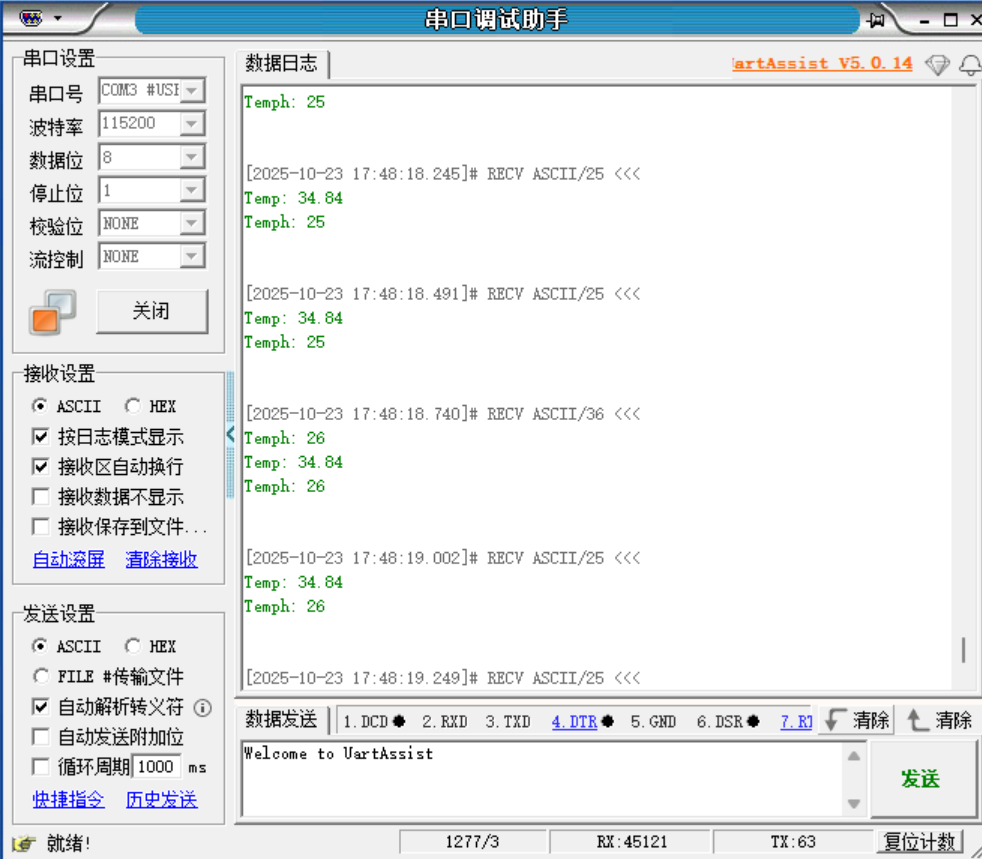1、实验原理:完成 OLED 屏与开发板的接口及接口设置;驱动 OLED 屏,对其进行初始
化;编程实现利用 STM32 芯片集成的 A/D 及温度传感器,采集芯片温度并处
理,将温度信息通过串口打印调试,同时显示在显示屏上。要求可通过按键
设置温度阈值,采集的温度信息若超出设置的温度阈值,将通过指示灯闪烁
报警。
2、ST7789 驱动的 SPI TFT LCD 屏幕的驱动在:STM32F103RCT6在ST7789 驱动的 SPI TFT LCD 屏幕上显示PWM占空比里面找:https://blog.csdn.net/weixin_46406816/article/details/153734837?sharetype=blogdetail\&sharerId=153734837\&sharerefer=PC\&sharesource=weixin_46406816\&spm=1011.2480.3001.8118
3、配置
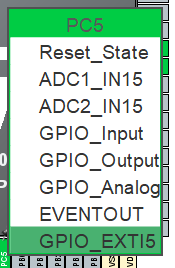
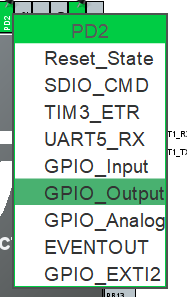
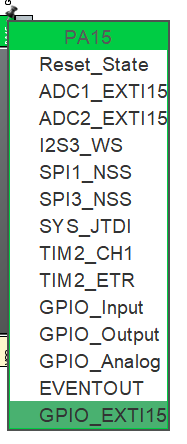
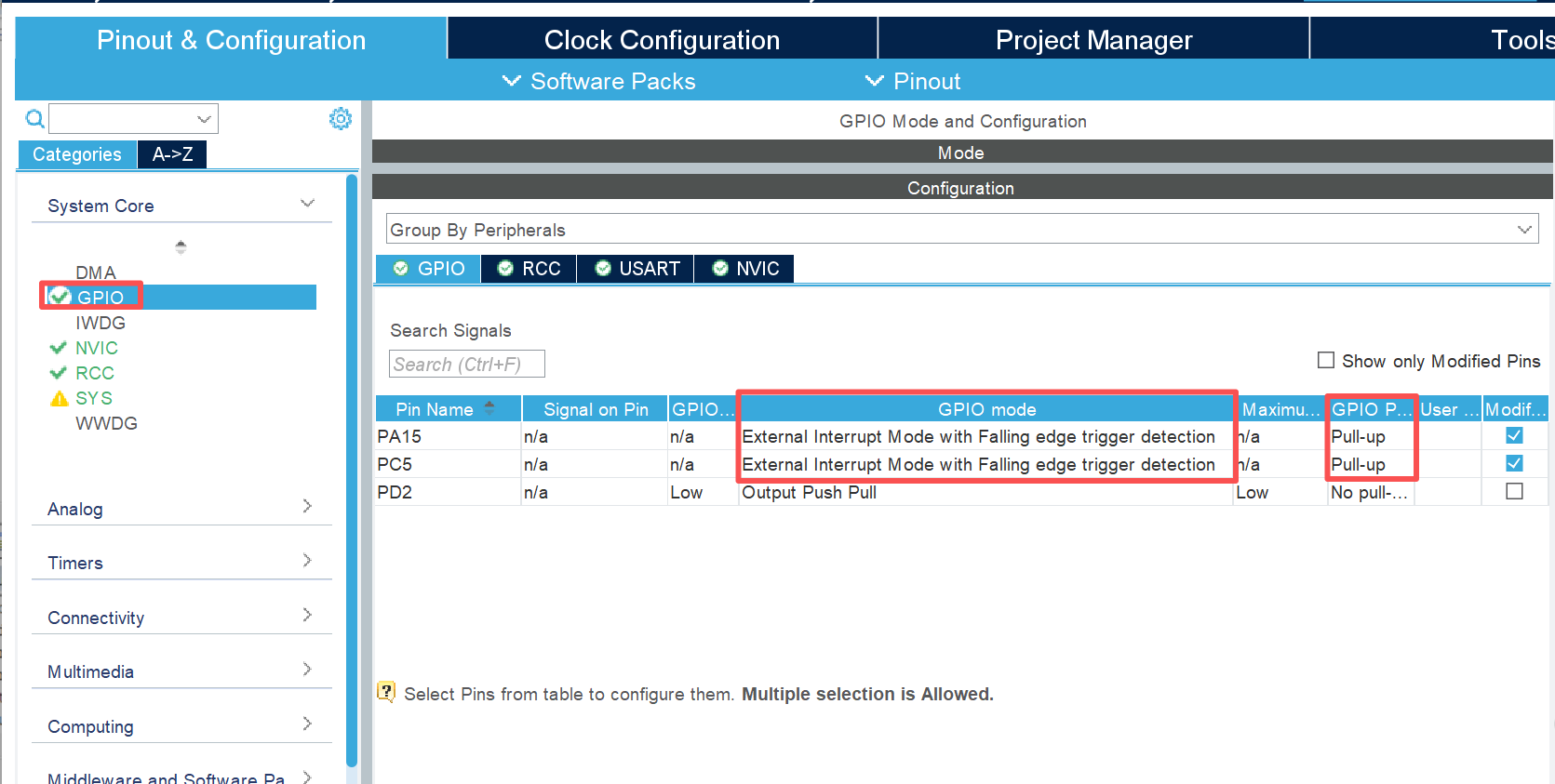
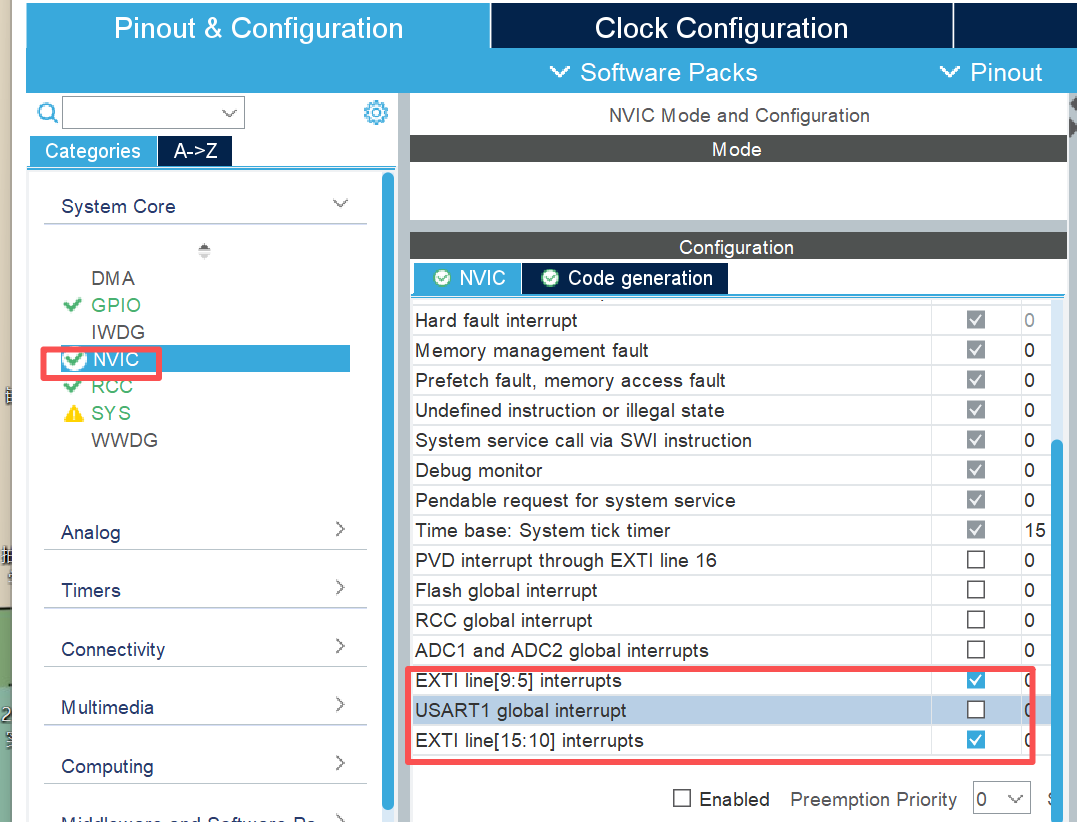
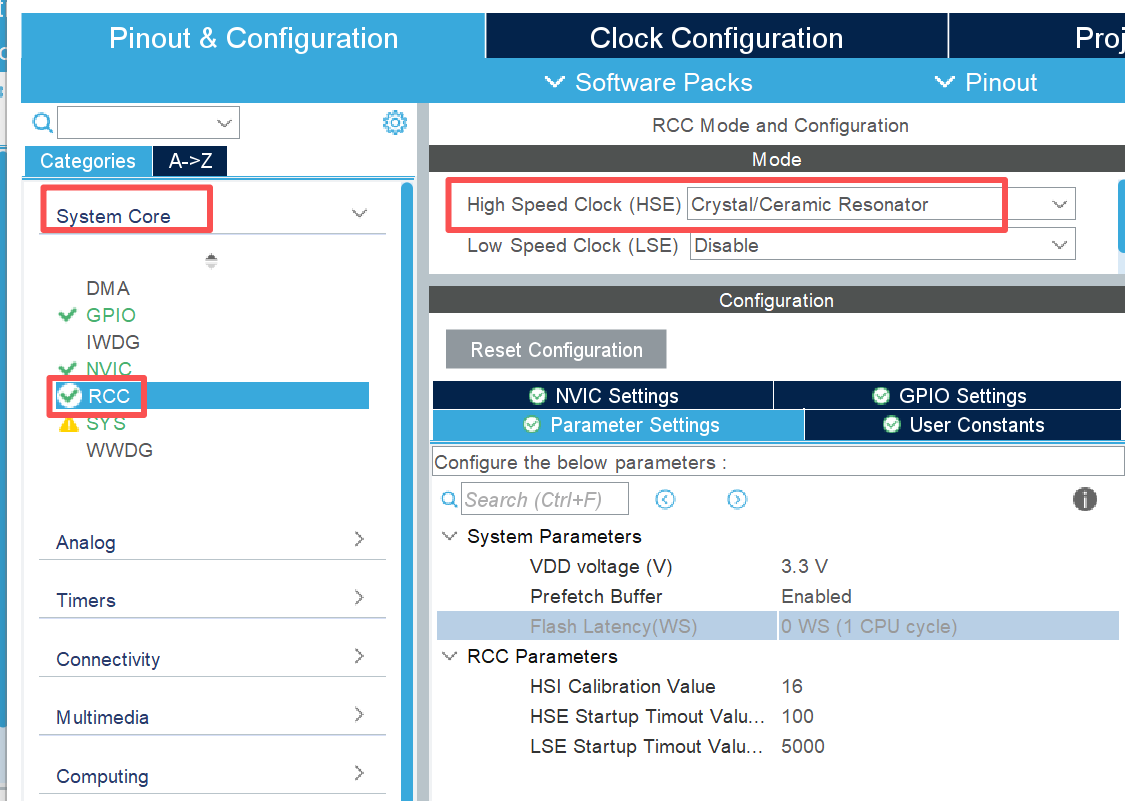
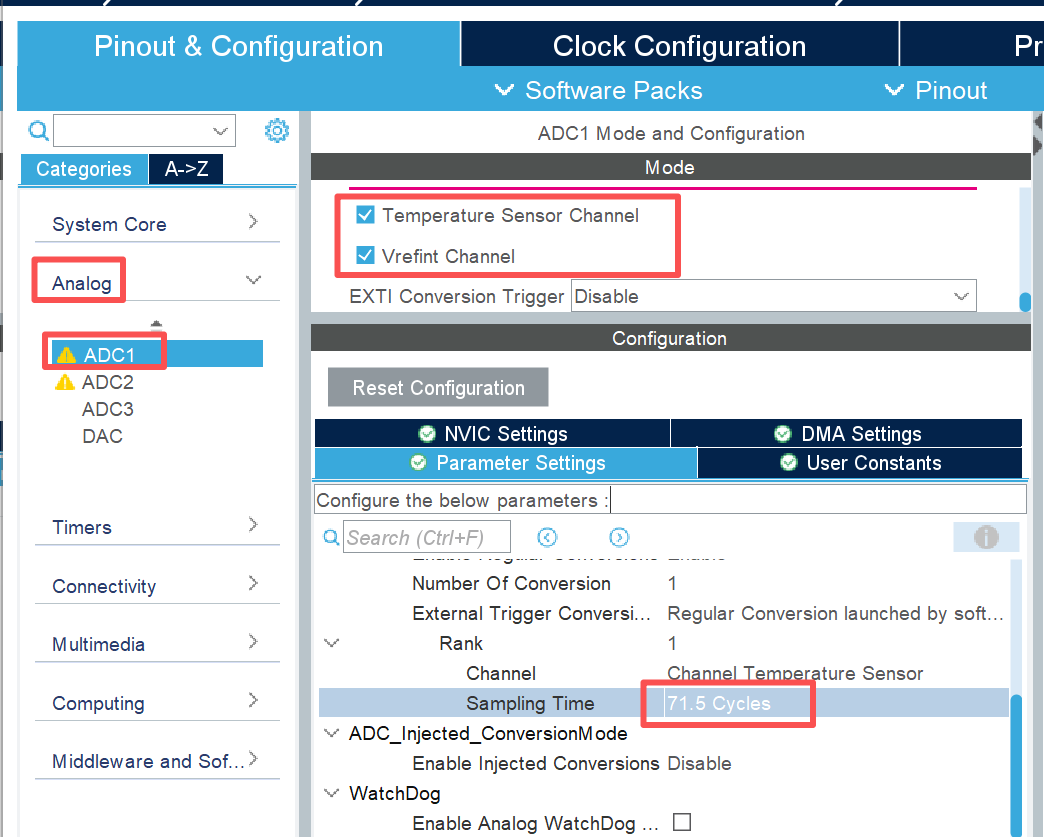
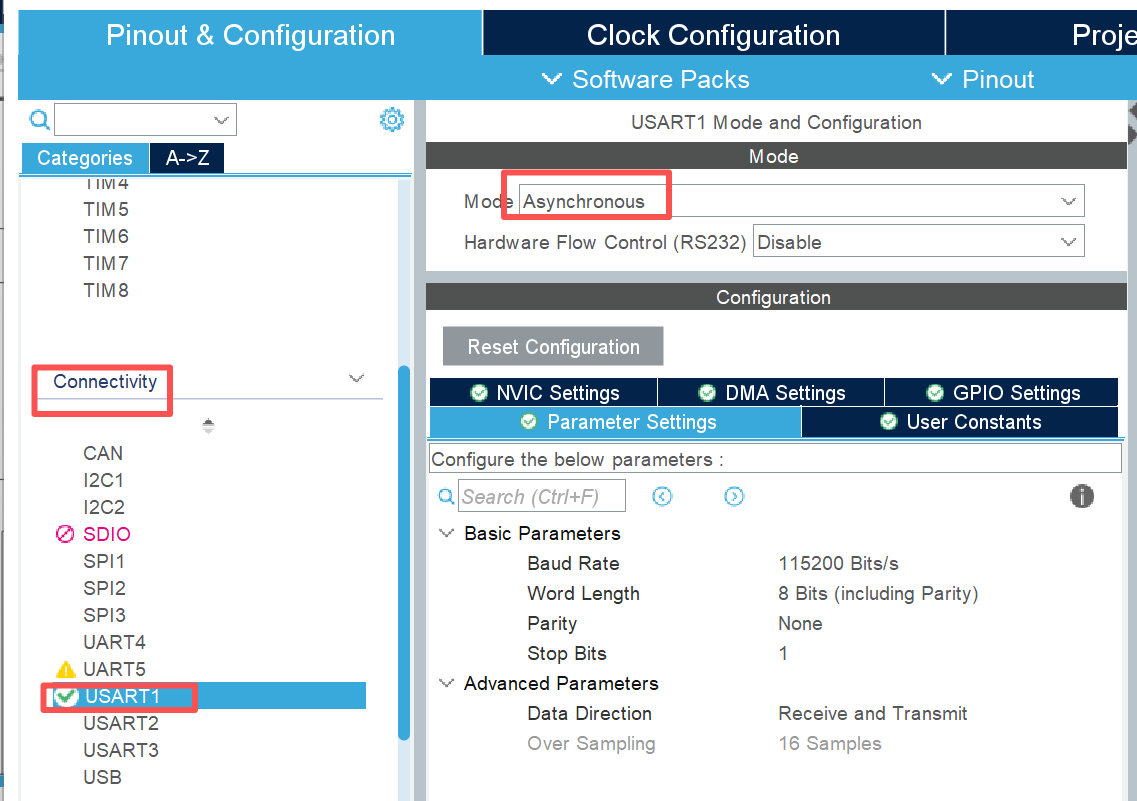
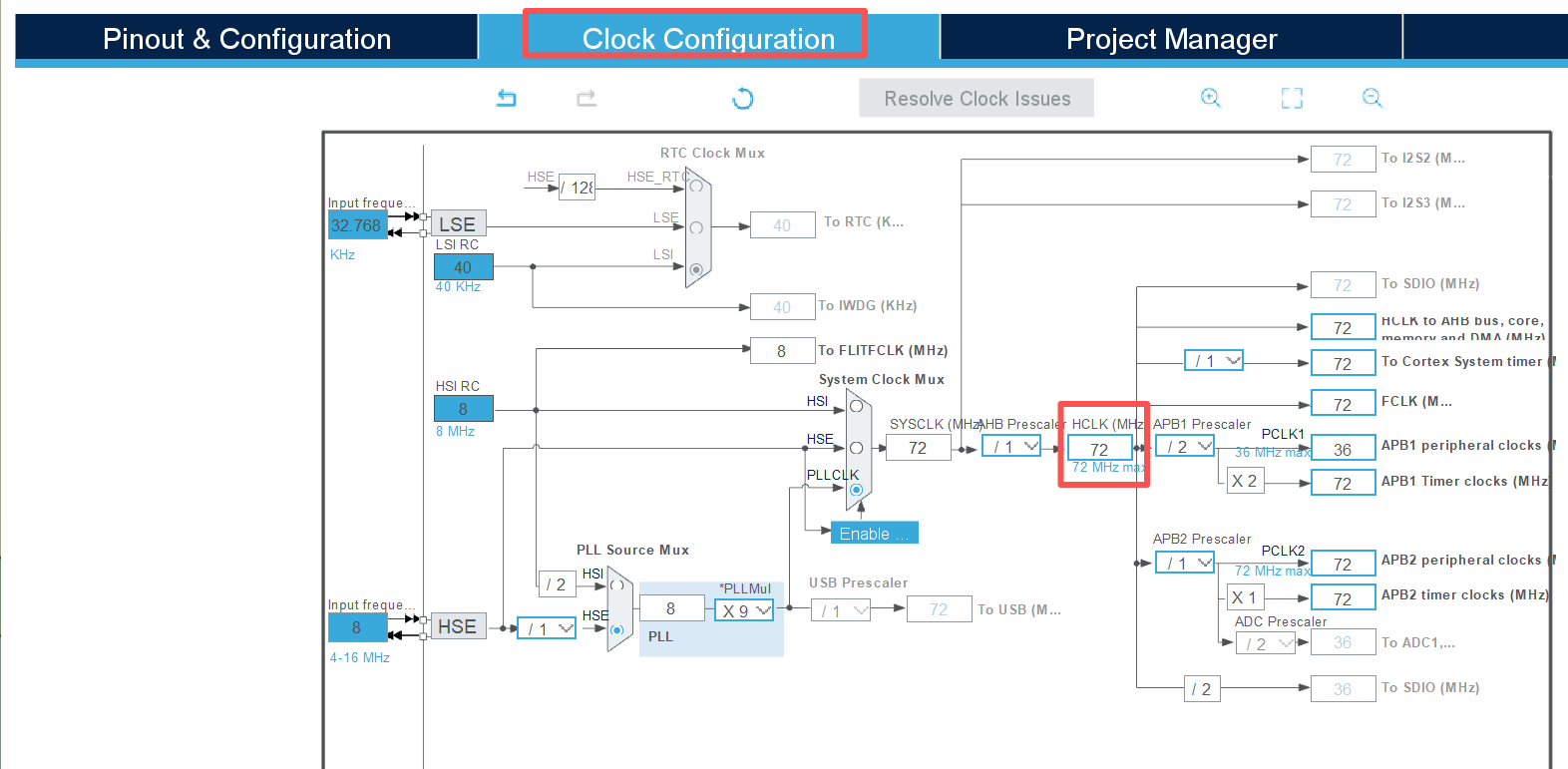
4、屏幕的驱动需要复制过来到E:\CubeMX\pwm_lcd\Core下面的文件夹,头文件和.c都要复制
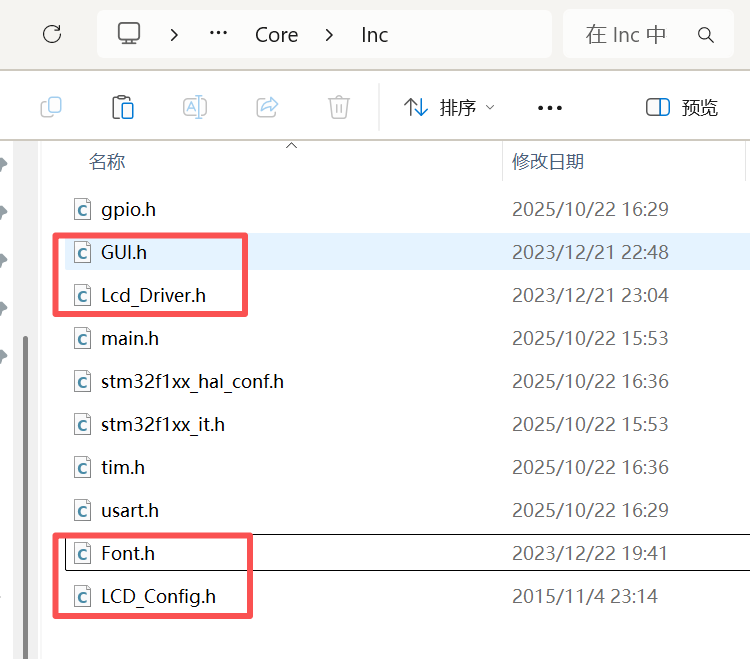
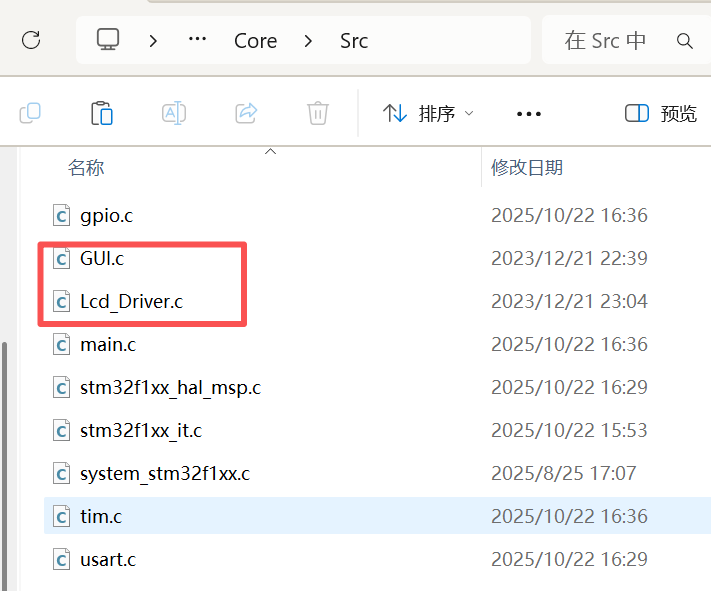
5、main.c
cpp
/* USER CODE BEGIN Header */
/**
******************************************************************************
* @file : main.c
* @brief : Main program body
******************************************************************************
* @attention
*
* Copyright (c) 2025 STMicroelectronics.
* All rights reserved.
*
* This software is licensed under terms that can be found in the LICENSE file
* in the root directory of this software component.
* If no LICENSE file comes with this software, it is provided AS-IS.
*
******************************************************************************
*/
/* USER CODE END Header */
/* Includes ------------------------------------------------------------------*/
#include "main.h"
#include "adc.h"
#include "usart.h"
#include "gpio.h"
/* Private includes ----------------------------------------------------------*/
/* USER CODE BEGIN Includes */
#include <stdio.h>
#include "GUI.h"
#include "Lcd_Driver.h"
/* USER CODE END Includes */
/* Private typedef -----------------------------------------------------------*/
/* USER CODE BEGIN PTD */
/* USER CODE END PTD */
/* Private define ------------------------------------------------------------*/
/* USER CODE BEGIN PD */
/* USER CODE END PD */
/* Private macro -------------------------------------------------------------*/
/* USER CODE BEGIN PM */
/* USER CODE END PM */
/* Private variables ---------------------------------------------------------*/
/* USER CODE BEGIN PV */
uint32_t value;
double value_vol;
double Temp;
int Temph=25;
volatile uint8_t Key0Pressed = 0; // PC5
volatile uint8_t Key1Pressed = 0; // PA15
/* USER CODE END PV */
/* Private function prototypes -----------------------------------------------*/
void SystemClock_Config(void);
/* USER CODE BEGIN PFP */
/* USER CODE END PFP */
/* Private user code ---------------------------------------------------------*/
/* USER CODE BEGIN 0 */
void HAL_GPIO_EXTI_Callback(uint16_t GPIO_Pin)
{
if (GPIO_Pin == GPIO_PIN_5) {
Key0Pressed = 1;
} else if (GPIO_Pin == GPIO_PIN_15) {
Key1Pressed = 1;
}
}
/* USER CODE END 0 */
/**
* @brief The application entry point.
* @retval int
*/
int main(void)
{
/* USER CODE BEGIN 1 */
/* USER CODE END 1 */
/* MCU Configuration--------------------------------------------------------*/
/* Reset of all peripherals, Initializes the Flash interface and the Systick. */
HAL_Init();
/* USER CODE BEGIN Init */
/* USER CODE END Init */
/* Configure the system clock */
SystemClock_Config();
/* USER CODE BEGIN SysInit */
/* USER CODE END SysInit */
/* Initialize all configured peripherals */
MX_GPIO_Init();
MX_ADC1_Init();
MX_USART1_UART_Init();
/* USER CODE BEGIN 2 */
Lcd_Init();
Lcd_Clear(GRAY0);
//HAL_ADCEx_Calibration_Start(&hadc1);
Gui_DrawFont_GBK24(0, 30, BLUE, GRAY0, (u8*)"2025/10/23"); // 日期
Gui_DrawFont_GBK24(0, 55, BLUE, GRAY0, (u8*)"2025000000"); // 学号
Gui_DrawFont_GBK16(0, 80, BLUE, GRAY0, (u8*)"NAME"); // 姓名
/* USER CODE END 2 */
/* Infinite loop */
/* USER CODE BEGIN WHILE */
while (1)
{
/* USER CODE END WHILE */
/* USER CODE BEGIN 3 */
// 处理 KEY0 (PC5)
if (Key0Pressed) {
Key0Pressed = 0;
HAL_Delay(10); // 消抖
if (HAL_GPIO_ReadPin(GPIOC, GPIO_PIN_5) == GPIO_PIN_RESET) {
Temph++;
printf("Temph: %d\r\n", Temph);
}
}
// 处理 KEY1 (PA15)
if (Key1Pressed) {
Key1Pressed = 0;
HAL_Delay(10);
if (HAL_GPIO_ReadPin(GPIOA, GPIO_PIN_15) == GPIO_PIN_RESET) {
Temph--;
printf("Temph: %d\r\n", Temph);
}
}
char temp_buf[32]; // 用于格式化温度字符串
if (HAL_ADC_Start(&hadc1) == HAL_OK)
{
if (HAL_ADC_PollForConversion(&hadc1, 10) == HAL_OK)
{
value = HAL_ADC_GetValue(&hadc1);
value_vol = (double)value*3.3/4095;
Temp = (1.43-value_vol)/0.0043 + 25;
printf("Temp: %.2f \r\n",Temp);
printf("Temph: %d\r\n", Temph);
if(Temph<Temp)
{
HAL_GPIO_WritePin(GPIOD,GPIO_PIN_2,GPIO_PIN_RESET);
}
else
{
HAL_GPIO_WritePin(GPIOD,GPIO_PIN_2,GPIO_PIN_SET);
}
sprintf(temp_buf, "Temph: %d C", Temph);
Gui_DrawFont_GBK16(0,100,RED,GRAY0, (unsigned char*)temp_buf);
sprintf(temp_buf, "Temp: %.2f C", Temp);
Gui_DrawFont_GBK16(0,120,BLUE,GRAY0, (unsigned char*)temp_buf);
}
else
{
printf("no complated!\r\n");
Gui_DrawFont_GBK24(0, 110, RED, GRAY0, (u8*)"ADC Error");
}
}
else
{
printf("no start!\r\n");
Gui_DrawFont_GBK24(0, 110, RED, GRAY0, (u8*)"Start Fail");
}
HAL_Delay(200);
}
/* USER CODE END 3 */
}
/**
* @brief System Clock Configuration
* @retval None
*/
void SystemClock_Config(void)
{
RCC_OscInitTypeDef RCC_OscInitStruct = {0};
RCC_ClkInitTypeDef RCC_ClkInitStruct = {0};
RCC_PeriphCLKInitTypeDef PeriphClkInit = {0};
/** Initializes the RCC Oscillators according to the specified parameters
* in the RCC_OscInitTypeDef structure.
*/
RCC_OscInitStruct.OscillatorType = RCC_OSCILLATORTYPE_HSE;
RCC_OscInitStruct.HSEState = RCC_HSE_ON;
RCC_OscInitStruct.HSEPredivValue = RCC_HSE_PREDIV_DIV1;
RCC_OscInitStruct.HSIState = RCC_HSI_ON;
RCC_OscInitStruct.PLL.PLLState = RCC_PLL_ON;
RCC_OscInitStruct.PLL.PLLSource = RCC_PLLSOURCE_HSE;
RCC_OscInitStruct.PLL.PLLMUL = RCC_PLL_MUL9;
if (HAL_RCC_OscConfig(&RCC_OscInitStruct) != HAL_OK)
{
Error_Handler();
}
/** Initializes the CPU, AHB and APB buses clocks
*/
RCC_ClkInitStruct.ClockType = RCC_CLOCKTYPE_HCLK|RCC_CLOCKTYPE_SYSCLK
|RCC_CLOCKTYPE_PCLK1|RCC_CLOCKTYPE_PCLK2;
RCC_ClkInitStruct.SYSCLKSource = RCC_SYSCLKSOURCE_PLLCLK;
RCC_ClkInitStruct.AHBCLKDivider = RCC_SYSCLK_DIV1;
RCC_ClkInitStruct.APB1CLKDivider = RCC_HCLK_DIV2;
RCC_ClkInitStruct.APB2CLKDivider = RCC_HCLK_DIV1;
if (HAL_RCC_ClockConfig(&RCC_ClkInitStruct, FLASH_LATENCY_2) != HAL_OK)
{
Error_Handler();
}
PeriphClkInit.PeriphClockSelection = RCC_PERIPHCLK_ADC;
PeriphClkInit.AdcClockSelection = RCC_ADCPCLK2_DIV6;
if (HAL_RCCEx_PeriphCLKConfig(&PeriphClkInit) != HAL_OK)
{
Error_Handler();
}
}
/* USER CODE BEGIN 4 */
int fputc(int ch,FILE *f)
{
HAL_UART_Transmit(&huart1,(uint8_t *)&ch,1,HAL_MAX_DELAY);
return ch;
}
int fgetc(FILE *f)
{
uint8_t ch;
HAL_UART_Receive(&huart1,(uint8_t *)&ch,1,HAL_MAX_DELAY);
return ch;
}
/* USER CODE END 4 */
/**
* @brief This function is executed in case of error occurrence.
* @retval None
*/
void Error_Handler(void)
{
/* USER CODE BEGIN Error_Handler_Debug */
/* User can add his own implementation to report the HAL error return state */
__disable_irq();
while (1)
{
}
/* USER CODE END Error_Handler_Debug */
}
#ifdef USE_FULL_ASSERT
/**
* @brief Reports the name of the source file and the source line number
* where the assert_param error has occurred.
* @param file: pointer to the source file name
* @param line: assert_param error line source number
* @retval None
*/
void assert_failed(uint8_t *file, uint32_t line)
{
/* USER CODE BEGIN 6 */
/* User can add his own implementation to report the file name and line number,
ex: printf("Wrong parameters value: file %s on line %d\r\n", file, line) */
/* USER CODE END 6 */
}
#endif /* USE_FULL_ASSERT */6、编译前记得在keil里勾选use microlib(只要有重定向,都要勾选这个)
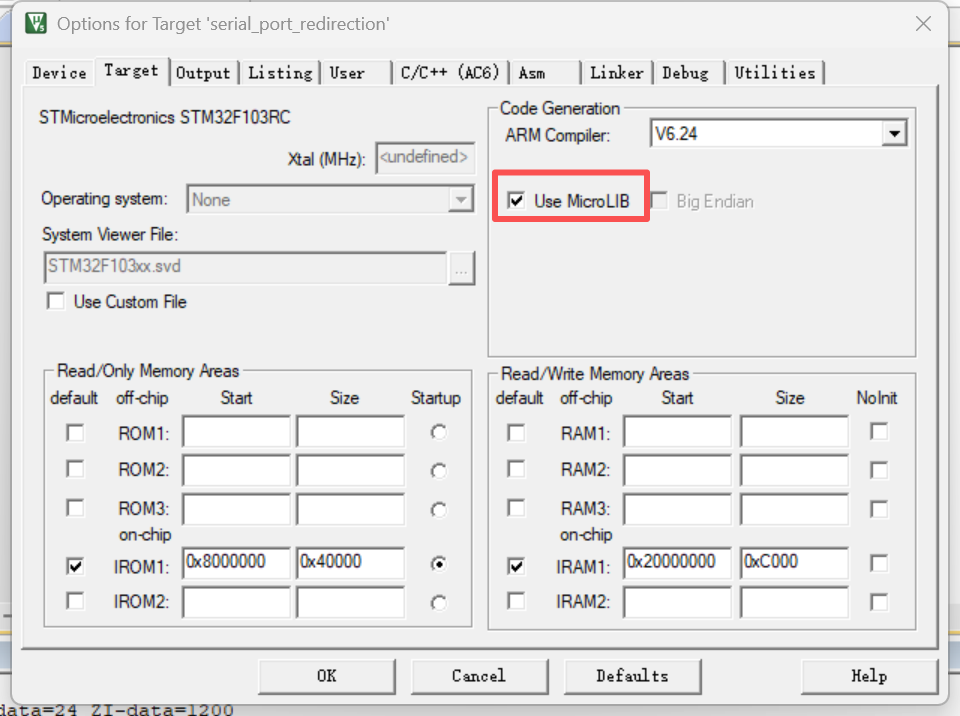
7、烧录,可以看到SPI小屏幕上,初始Temph:25 C
按键key0,则Temph增加1度;按键key1,则Temph减少1度。
当Temp温度大于Temph时,Led1亮灯报警;当Temp温度小于Temph时,Led1灯灭。
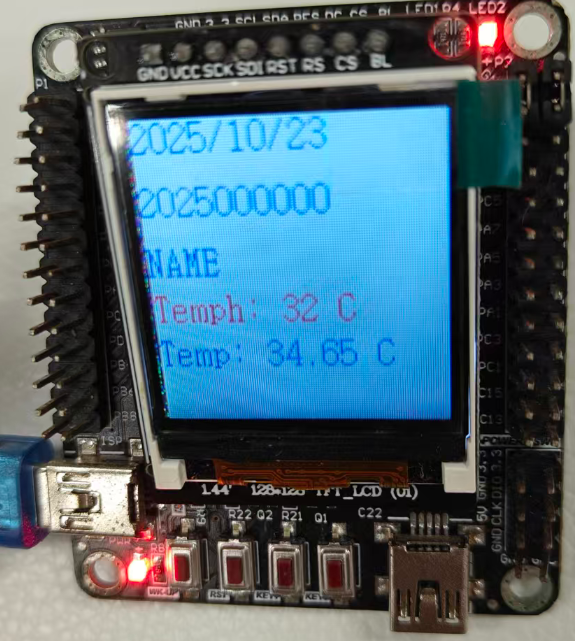
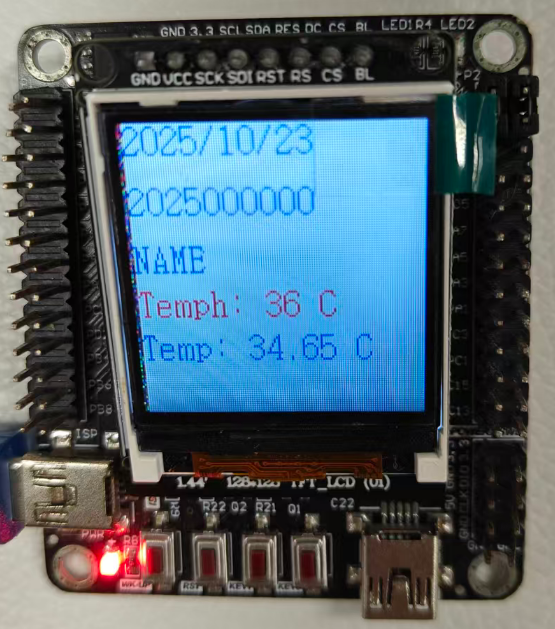
串口助手也可以同时观测到温度Temp及Temph的变化
